URGENT
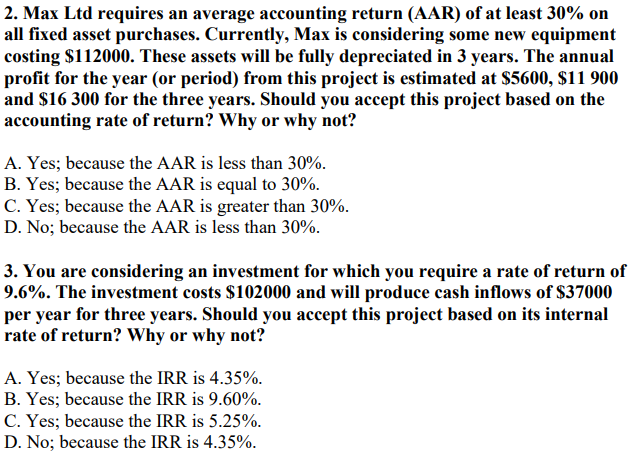


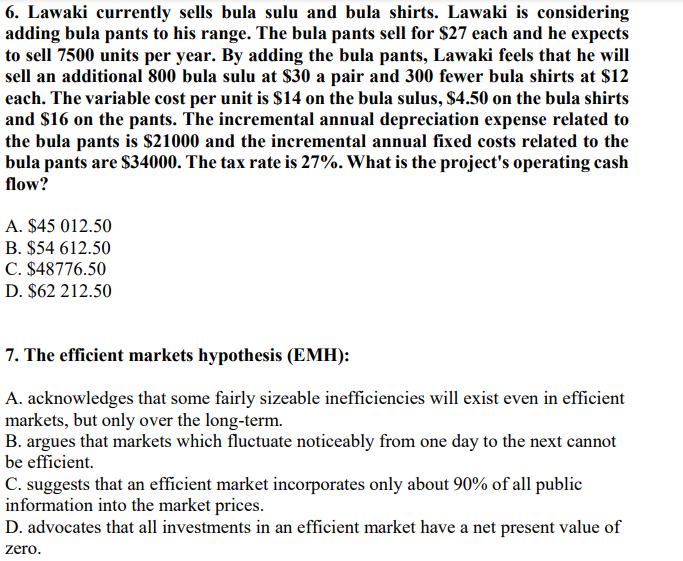
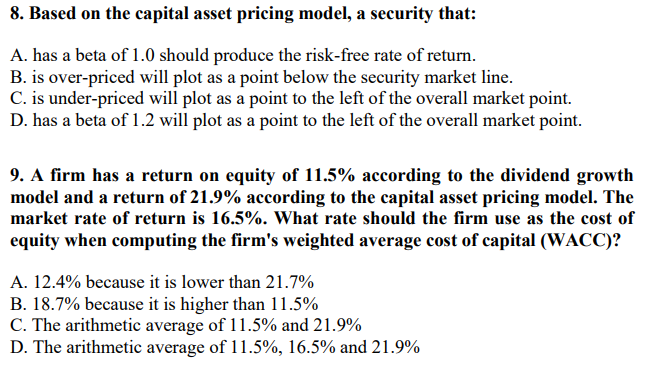
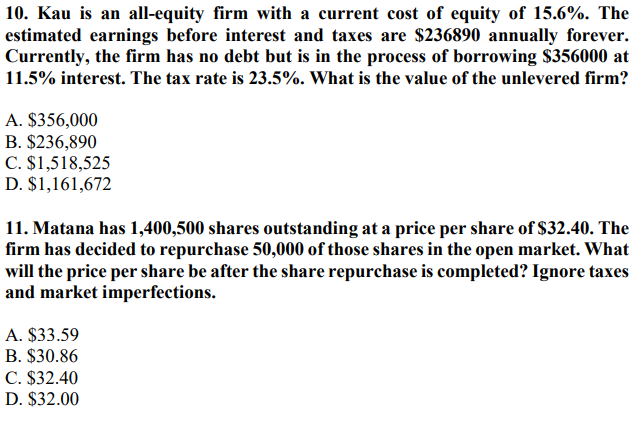
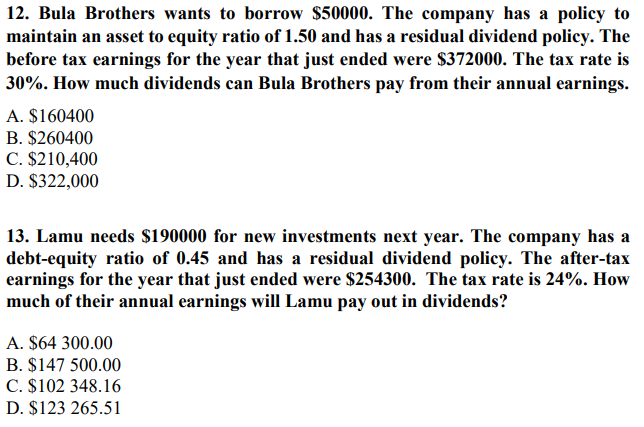
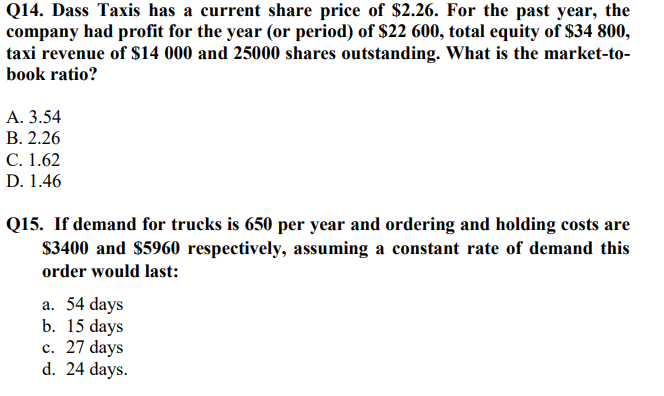
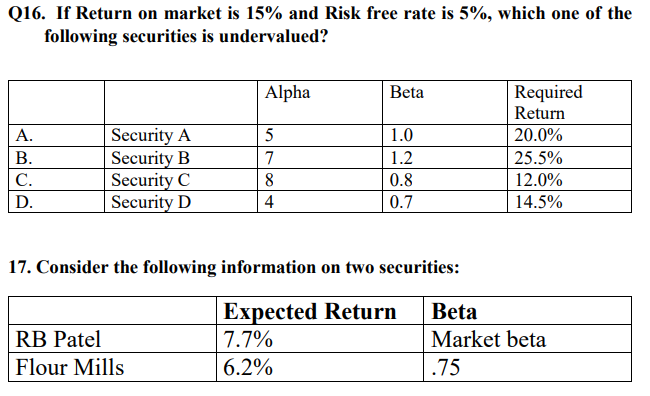
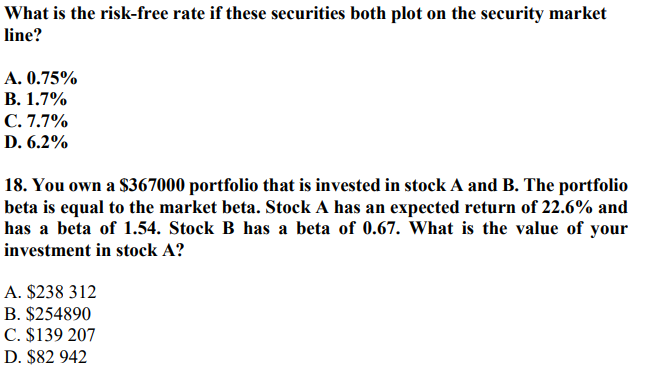
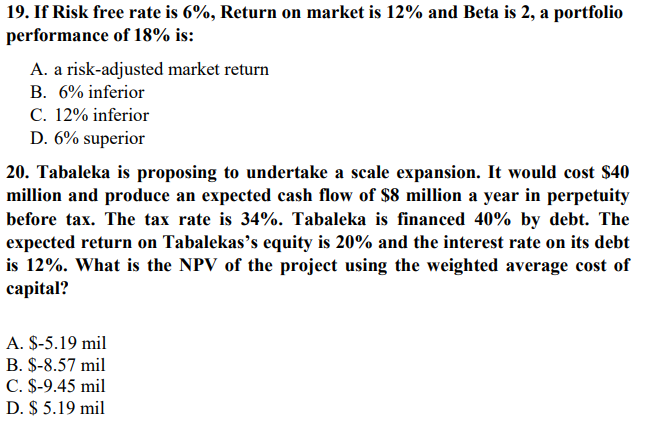
2. Max Ltd requires an average accounting return (AAR) of at least 30% on all fixed asset purchases. Currently, Max is considering some new equipment costing $112000. These assets will be fully depreciated in 3 years. The annual profit for the year (or period) from this project is estimated at $5600, $11 900 and $16 300 for the three years. Should you accept this project based on the accounting rate of return? Why or why not? A. Yes; because the AAR is less than 30%. B. Yes; because the AAR is equal to 30%. C. Yes; because the AAR is greater than 30%. D. No; because the AAR is less than 30%. 3. You are considering an investment for which you require a rate of return of 9.6%. The investment costs $102000 and will produce cash inflows of $37000 per year for three years. Should you accept this project based on its internal rate of return? Why or why not? A. Yes; because the IRR is 4.35%. B. Yes; because the IRR is 9.60%. C. Yes; because the IRR is 5.25%. D. No; because the IRR is 4.35%. 4. The net present value of a project's cash inflows is $3233.45 at a discount rate of 12% and IRR is 4.5%. The profitability index is 1.12 and the firm's tax rate is 34%. What is the initial cost of the project? A. $3621.46 B. $3378.95 C. $2887.00 D. $2491.74 5. A cost-cutting project will decrease costs by $32000 a year. The annual depreciation on the project's non-current assets will be $7900 and the tax rate is 31%. What is the amount of the change in the firm's operating cash flow created by this project? A. -$24100 B. -$6212 C. $16629 D. $24529 6. Lawaki currently sells bula sulu and bula shirts. Lawaki is considering adding bula pants to his range. The bula pants sell for $27 each and he expects to sell 7500 units per year. By adding the bula pants, Lawaki feels that he will sell an additional 800 bula sulu at $30 a pair and 300 fewer bula shirts at $12 each. The variable cost per unit is $14 on the bula sulus, $4.50 on the bula shirts and $16 on the pants. The incremental annual depreciation expense related to the bula pants is $21000 and the incremental annual fixed costs related to the bula pants are $34000. The tax rate is 27%. What is the project's operating cash flow? A. $45 012.50 B. $54 612.50 C. $48776.50 D. $62 212.50 7. The efficient markets hypothesis (EMH): A. acknowledges that some fairly sizeable inefficiencies will exist even in efficient markets, but only over the long-term. B. argues that markets which fluctuate noticeably from one day to the next cannot be efficient. C. suggests that an efficient market incorporates only about 90% of all public information into the market prices. D. advocates that all investments in an efficient market have a net present value of zero. 8. Based on the capital asset pricing model, a security that: A. has a beta of 1.0 should produce the risk-free rate of return. B. is over-priced will plot as a point below the security market line. C. is under-priced will plot as a point to the left of the overall market point. D. has a beta of 1.2 will plot as a point to the left of the overall market point. 9. A firm has a return on equity of 11.5% according to the dividend growth model and a return of 21.9% according to the capital asset pricing model. The market rate of return is 16.5%. What rate should the firm use as the cost of equity when computing the firm's weighted average cost of capital (WACC)? A. 12.4% because it is lower than 21.7% B. 18.7% because it is higher than 11.5% C. The arithmetic average of 11.5% and 21.9% D. The arithmetic average of 11.5%, 16.5% and 21.9% 10. Kau is an all-equity firm with a current cost of equity of 15.6%. The estimated earnings before interest and taxes are $236890 annually forever. Currently, the firm has no debt but is in the process of borrowing $356000 at 11.5% interest. The tax rate is 23.5%. What is the value of the unlevered firm? A. $356,000 B. $236,890 C. $1,518,525 D. $1,161,672 11. Matana has 1,400,500 shares outstanding at a price per share of $32.40. The firm has decided to repurchase 50,000 of those shares in the open market. What will the price per share be after the share repurchase is completed? Ignore taxes and market imperfections. A. $33.59 B. $30.86 C. $32.40 D. $32.00 12. Bula Brothers wants to borrow $50000. The company has a policy to maintain an asset to equity ratio of 1.50 and has a residual dividend policy. The before tax earnings for the year that just ended were $372000. The tax rate is 30%. How much dividends can Bula Brothers pay from their annual earnings. A. $160400 B. $260400 C. $210,400 D. $322,000 13. Lamu needs $190000 for new investments next year. The company has a debt-equity ratio of 0.45 and has a residual dividend policy. The after-tax earnings for the year that just ended were $254300. The tax rate is 24%. How much of their annual earnings will Lamu pay out in dividends? A. $64 300.00 B. $147 500.00 C. $102 348.16 D. $123 265.51 Q14. Dass Taxis has a current share price of $2.26. For the past year, the company had profit for the year (or period) of $22 600, total equity of $34 800, taxi revenue of $14 000 and 25000 shares outstanding. What is the market-to- book ratio? A. 3.54 B. 2.26 C. 1.62 D. 1.46 Q15. If demand for trucks is 650 per year and ordering and holding costs are $3400 and $5960 respectively, assuming a constant rate of demand this order would last: a. 54 days b. 15 days c. 27 days d. 24 days. Q16. If Return on market is 15% and Risk free rate is 5%, which one of the following securities is undervalued? Alpha Beta A. B. C. D. Security A Security B Security C Security D 5 7 8 4 1.0 1.2 0.8 0.7 Required Return 20.0% 25.5% 12.0% 14.5% 17. Consider the following information on two securities: RB Patel Flour Mills Expected Return 7.7% 6.2% Beta Market beta .75 What is the risk-free rate if these securities both plot on the security market line? A. 0.75% B. 1.7% C. 7.7% D. 6.2% 18. You own a $367000 portfolio that is invested in stock A and B. The portfolio beta is equal to the market beta. Stock A has an expected return of 22.6% and has a beta of 1.54. Stock B has a beta of 0.67. What is the value of your investment in stock A? A. $238 312 B. $254890 C. $139 207 D. $82 942 19. If Risk free rate is 6%, Return on market is 12% and Beta is 2, a portfolio performance of 18% is: A. a risk-adjusted market return B. 6% inferior C. 12% inferior D. 6% superior 20. Tabaleka is proposing to undertake a scale expansion. It would cost $40 million and produce an expected cash flow of $8 million a year in perpetuity before tax. The tax rate is 34%. Tabaleka is financed 40% by debt. The expected return on Tabalekas's equity is 20% and the interest rate on its debt is 12%. What is the NPV of the project using the weighted average cost of capital? A. $-5.19 mil B. $-8.57 mil C. $-9.45 mil D. $ 5.19 mil

















